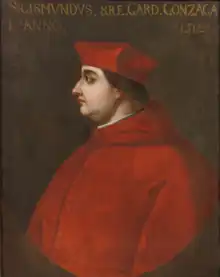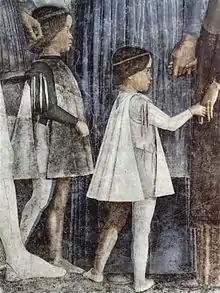Sigismondo Gonzaga | |
|---|---|
 Portrait by an unknown artist, c. 1509 | |
| Church | Roman Catholic |
| Other post(s) | Apostolic protonotary, apostolic legate, administrator of the Diocese of Aversa |
| Orders | |
| Created cardinal | 1 December 1505 by Pope Julius II |
| Personal details | |
| Born | 1469 |
| Died | October 3, 1525 Mantua |
| Nationality | Italian |
| Denomination | Roman Catholic |
Sigismondo Gonzaga (1469, Mantua – 3 October 1525, Mantua) was an Italian cardinal. He was the third son of Federico I Gonzaga, Marquess of Mantua.
Life

He was the son of Frederick I of Mantua and commanded his brother Francesco II's troops before beginning his ecclesiastical career.[1] He became apostolic protonotary. Pope Julius II was made a cardinal in the consistory of 1 December 1505.[2] He was made apostolic administrator of Mantua from 1511 to 1521, finally resigning the post in favour of his nephew Ercole. He gained much sympathy from the schismatic cardinals but remained faithful to Julius II.[3]
He became apostolic legate to Bologna in 1511 and 1512 and legate to the March of Ancona and Mantua.[4] He took part in the 1513 conclave which elected pope Leo X, that of 1521-22 that elected pope Hadrian VI and that of 1523 that elected pope Clement VII. He ended his career as administrator of Aversa at the start of 1524. He was the great-uncle of cardinals Francesco Gonzaga (1561) and Giovanni Vincenzo Gonzaga (1578).[5] Other cardinals in the family were Francesco Gonzaga (1461), Pirro Gonzaga (1527), Scipione Gonzaga (1587), Ferdinando Gonzaga (1607) and Vincenzo Gonzaga (1615).
References
- ↑ (in Italian) Mario Castagna, Stemmi e vicende di casate mantovane, Montichari, 2002. ISBN non esistente
- ↑ 'Sigismondo Gonzaga' in The Cardinals of the Holy Roman Church
- ↑ (in Italian) Rosanna Golinelli Berto. Associazione per i monumenti domenicani (a cura di), Sepolcri Gonzagheschi, Mantova, 2013.
- ↑ (in Italian) His investiture to the Diocese of Mantua
- ↑ (in Italian) Raffaele Tamalio, GONZAGA, Sigismondo, in Dizionario biografico degli italiani, vol. 57, Roma, Istituto dell'Enciclopedia Italiana, 2001.